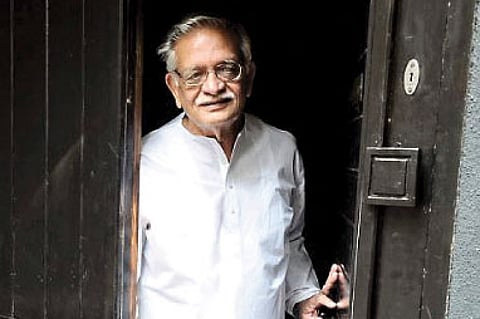

From poetry to lyrics and screenplays for films, from children books to directing films, Gulzar has done it all. For the last 50 years, he has been a constant presence in the fields of Indian literature and cinema. There are several books and articles on his ingenious and artistic contributions. Nasreen Munni Kabir’s book, In the Company of a Poet, comprise many long conversations with Gulzar, and thereby tells us about his prodigious journey of the last 78 years in his own soulful style. The very nature of the book makes it interesting and enriching.
Kabir researched on Hindi films for many years and has come out with several important books and documentaries. This book is the latest addition to her vast corpus in which she converses with Gulzar as he unfolds the complex and enigmatic inner layers of his life and works. Kabir just lets him talk, but, at times, she brings him back on the particular aspect if he drifts away, and when needed, she gently provokes him to open up. The entire presentation makes the reader feel that one is also present to witness the conversation.
Gulzar is known to surprise his readers and audiences with his unique use of imagery and words. And he does it in this book. The first surprise is to know that the most of this intense conversation was done through Skype, an internet tool for video chat. Even Kabir was amazed. Gulzar told her that AR Rahman downloaded the application in his laptop and taught him how to use. Now we know that his fine-tuning with the contemporary often results in the songs like Aankhen bhi Kamaal Karti Hain, Personal se Sawal Karti Hain, or Dil to Bachcha Hai Ji!
The book informs us about his early days in Dina (now in Pakistan) and in Delhi where he started to write stories and poems, but his father sent him to Bombay to join his brother’s business. However, he was determined to be a writer and pursued that vocation with utmost dedication in the new city, in the company of left-leaning writers. The book records memories of his father and the large family with subtle warmth and profound reflection, and it is revealed that these years are crucial in the formation of a compassionate and graceful Gulzar, the person and the poet.
With the same intensive contemplation, Gulzar talks about his mentors, contemporaries and colleagues from literature and films, taking us on a romantic-historic journey of Bombay cinema. But everywhere, a conscious poet is present opining on India’s literary scenario with deep insights. Gulzar also shares his affectionate bonding with wife Rakhee, daughter Meghna aka Bosky and her husband Govind and grandson Samay. He talks about his staff and acquaintances beyond the literary and film arena with equal respects.
His relationship with Meena Kumari and the much-talked about rumour of diary of her verses are also part of the conversation. He reveals his plan to publish a book consisting of her notes. He also tells us about pending books and scripts, as well as about his association with the welfare of hearing-impaired people. When writings on Indian cinema is either confined to stars or based on the imported theories, this book is a great addition that unriddles the grand persona of a legend.